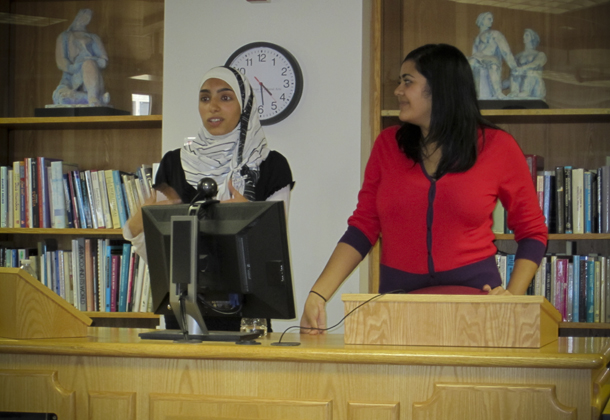When a group of students hung around after Professor Ralph Young’s class on September 12th, 2001, he said, he couldn’t have foreseen that their animated discussion on U.S. foreign policy would eventually turn into what is now his “teach-in” program.
Yesterday, Sept. 9, in Anderson Hall, that program came full circle as it marked its 10th year of informing and involving students in discussion and debate.
Friday’s teach-in, entitled “9/11 and Muslims in America: 10 Years After,” offered students a chance to hear from two of their fellow Temple students on growing up Muslim in a post-9/11 America.
“We’re here because we want everyone to know that the effects of that day are still very prevalent in U.S. Society,” said Sara Khan, a junior journalism major and a leader of the program. “I grew up with the idea of America being this melting pot, it’s just shocking to see that an ‘American’ has a certain race, a certain religion, and I don’t necessarily fit into that.”
Khan’s sentiments were echoed by fellow presenter Wafai Dias, also a junior journalism major.
In eighth grade, Dias said, her class watched a video on the attacks of 9/11.
“A kid turned around and said to me, ‘Do you see what your people did? Do you see what your relatives did?’” Dias said.
From Dias’ and Khan’s accounts of childhood discriminations, attending students were able to get a small glimpse into the hardships of growing up Muslim in a post-9/11 world.

Khan and Dias said “get the hell out of this country,” to “aren’t you related to Osama Bin Laden?” are just two of a number of everyday slurs thrown at Muslim youth.
Brianna Walls, a junior psychology major, came to the teach-in in the hopes of hearing a different perspective.
“I don’t know many Muslim people,” Walls said. “I wanted to learn their views and how they felt after 9/11.”
Emily Fetters, also a junior psychology major, agreed with Walls’s sentiments and said she was also impressed with the presenters’ chemistry.
Despite different post-9/11 experiences, and variations in their beliefs, Khan and Dias put forth a unified front for the audience.
“It was interesting that [Khan and Dias] were very different,” Fetters said. “But they came together to talk about this to us.”
Their efforts left a lasting impression on student Sara Attia, a sophomore social work major.
“Wafai said she was at a rally when she realized that hate is hate,” Attia said. “It made me realize: There are so many people out there that don’t hate, but the people that do hate stick out to us.”
Both Khan and Dias said they were grateful for the opportunity to share their stories with their fellow students.
“I want people to know that there are little kids in school being discriminated against,” Dias said. “I want people to think about that, about what these students have to deal with.”
Khan further urged her fellow students to fight the discrimination and prejudices that still remain in post-9/11 America.
“Before you label someone, it’s very necessary to make sure you know who they are,” Khan said. “The best way to beat prejudice is to educate oneself.”
Ali Watkins can be reached at allison.watkins@temple.edu.



Be the first to comment